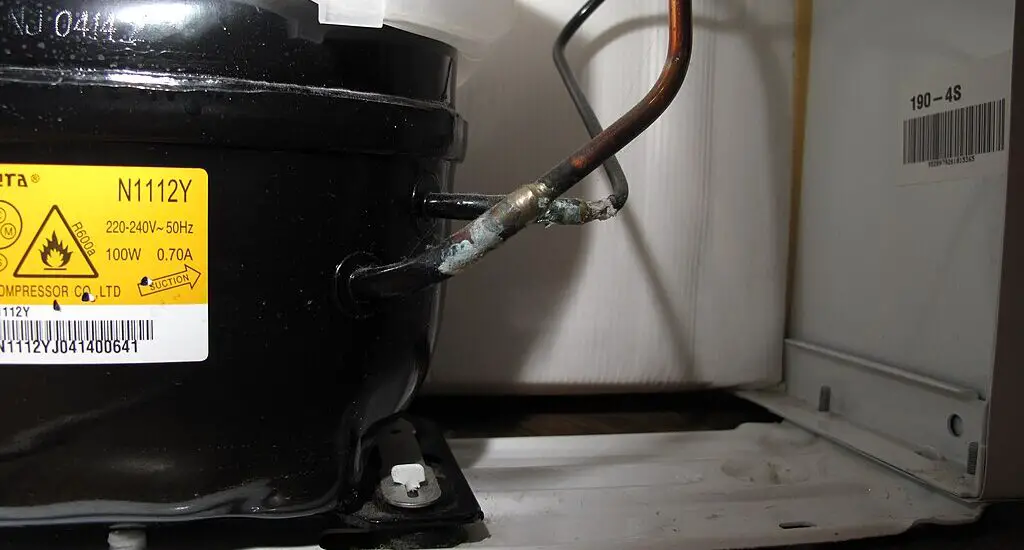One of the common questions about refrigerator mechanics is: “Does a refrigerator have 2 compressors?” In this comprehensive guide, we address this query head-on, diving deep into the design and functionality of refrigerators. Let’s get started.

Table of Contents
Does a Refrigerator Have 2 Compressors?
“Does a refrigerator have 2 compressors?” The answer to that question depends on the design of the refrigerator in question. Some refrigerators are designed with a single compressor while others have 2 compressors. Why do manufacturers do this you might wonder? Well, keep reading to get the full 411 information.
Single Compressor Refrigerators
Most refrigerators found in homes across the world feature a single compressor design. In these models:
One compressor regulates the temperature for both the fridge and freezer compartments.
There’s a shared air passage between the fridge and freezer, which can sometimes lead to issues like odor transfer.
Maintaining separate optimal temperatures for both compartments is more challenging, especially when doors are opened frequently.
They are typically more affordable and have fewer parts that might need repairs in the long run.
Why Some Refrigerators Have Two Compressors
The concept of having two compressors in a refrigerator stems from the need to optimize and refine the refrigeration process. Let’s delve into why some models incorporate this design:
Independent Cooling: Each compressor in a dual-compressor refrigerator is solely dedicated to one section – either the fridge or the freezer. This means that the cooling process for each section is entirely independent, allowing for more precise temperature control.
Flexibility in Operation: In situations where one section doesn’t require cooling (like when the fridge is empty but the freezer is full), the corresponding compressor can remain inactive, reducing energy consumption.
Reduced Risk of Cross-Contamination: As each section has its cooling system, there’s minimal risk of air (and odors) transferring between the compartments.
Quick Recovery: After opening the door of either the fridge or freezer, the dedicated compressor can work to bring that section back to the optimal temperature more rapidly.
Check out these other articles…
RV Refrigerator Compressor Not Coming On: Easy Steps to Fix
Everchill RV Refrigerator Compressor Not Working: How to Fix
Norcold RV Refrigerator Compressor Not Turning On: Easy Fix
Refrigerator Compressor Runs for 5 Seconds: Quick Solutions
Refrigerator Compressor Upside Down: 5 Easy Steps to Fix It
Which Type of Compressor is Best for Refrigerator? Revealed
Refrigerator Compressor Vacuum Pressure: Comprehensive Guide
The Traditional Single Compressor Design
Single-compressor designs have been the standard in the refrigeration industry for a long time. But what does this setup entail?
Unified Cooling: A single compressor manages the cooling process for both the fridge and the freezer. This often means that the two sections are interdependent when it comes to temperature regulation.
Economic Advantage: Refrigerators with a single compressor design are generally more affordable due to fewer components and a simpler design.
Space-Saving: With only one compressor, these refrigerators might be more compact, making them suitable for smaller spaces or households with limited storage requirements.
Maintenance: There’s only one compressor to maintain or replace if it fails, potentially reducing repair costs. However, if the single compressor malfunctions, both the fridge and freezer sections are affected.
Advantages of Dual Compressor Refrigerators
Refrigerators with dual compressors have been gaining popularity due to the distinct advantages they offer:
Superior Temperature Control: As each compartment has a dedicated compressor, it can achieve and maintain its ideal temperature with minimal influence from the other compartment. This is especially handy when you need to defrost the freezer without affecting the fridge’s temperature.
Energy Efficiency: Modern dual compressor refrigerators are often designed with energy efficiency in mind. By allowing one compressor to rest while the other operates, it can lead to reduced energy consumption over time.
Odor Isolation: Foods, especially those with strong odors, can impact the overall freshness of other items. With two separate cooling systems, the chances of odors transferring from the freezer’s fish to the fridge’s milk, for instance, are significantly reduced.
Durability: Since each compressor operates only half as much as it would in a single compressor system, there might be less wear and tear, potentially extending the lifespan of the appliance.